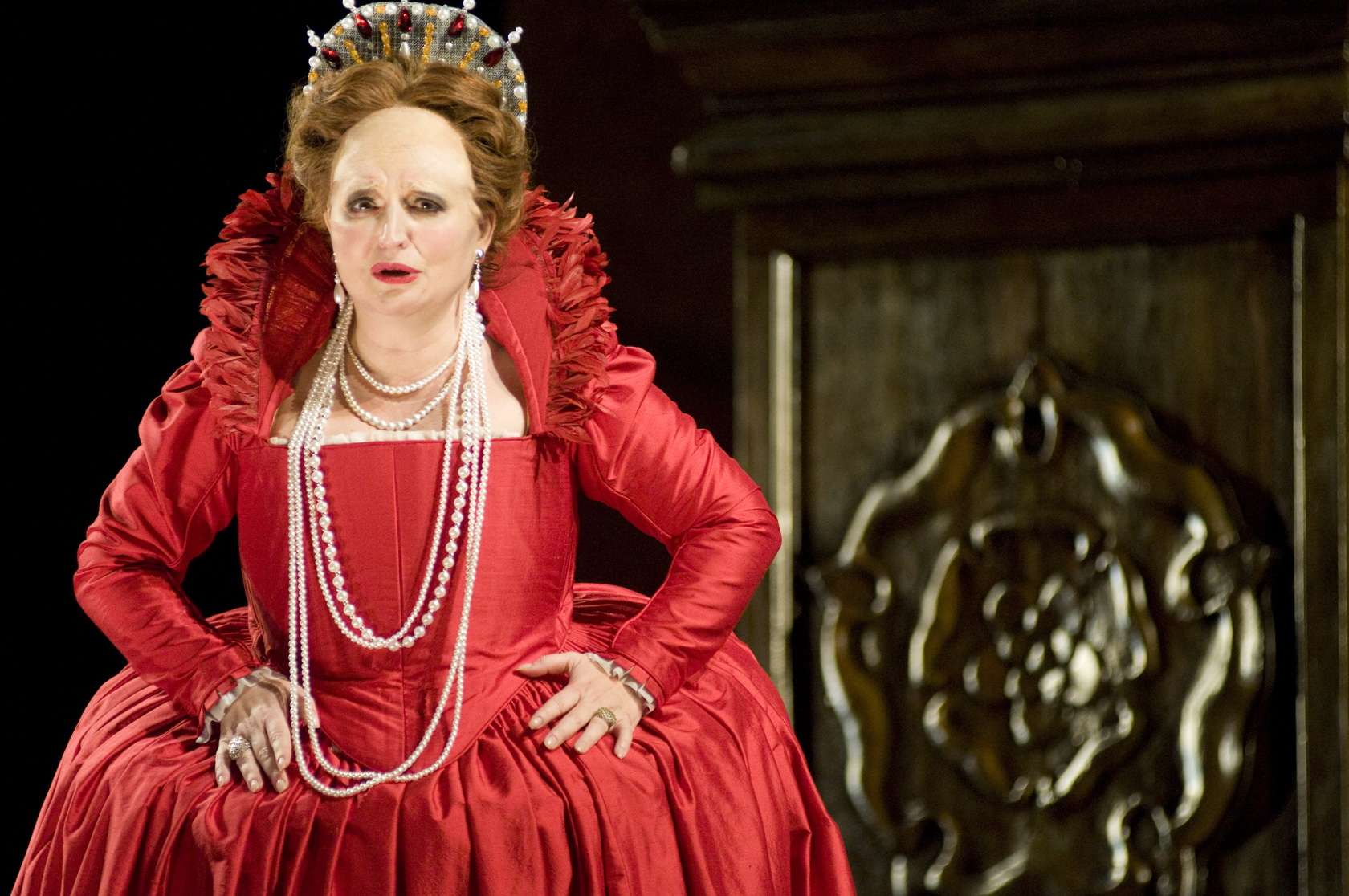|
Back
Elizabethan Fireworks Montréal
Salle Wilfrid-Pelletier
11/13/2010 - & November 17, 20*, 22 and 25
Gaetano Donizetti: Roberto Devereux
Alexey Dolgov (Roberto Devereux), Dimitra Theodossiou (Elisabeth 1st), Elizabeth Batton (Sarah), James Westman (Nottingham), Riccardo Ianello (Lord Cecil), Taras Kulish (Sir Walter Raleigh), Philip Kalmanovitch (server), Sébastien Ouellet (a page)
Orchestre Métropolitain and Chœur de l’Opéra de Montréal, Claude Webster (chorus master), Francesco Maria Colombo (conductor)
Kevin Newbury (director), Neil Patel (set designer), Jessica Jahn (costumes), D. M. Wood (lighting)

D. Theodossiou (© Yves Renaud/Courtesy of OM)
Opéra de Montréal is to be commended for bringing to Québec for the first time a production of Donizetti’s lyric tragedy, Roberto Devereux. It is a refreshing change from the standard Donizetti palette. The last (1837) of his “Tudor Trilogy” (after Anna Bolena and Maria Stuarda), it is arguably the most dramatic, intense and tightly woven. Donizetti chose to emphasize the dramatic action in this opera rather than tossing off decorative coloratura at every turn. And with a tight, almost chamber-like plot, and singing concentrated on four principals and chorus, it delivers all the drama and excitement one could expect from a bel canto opera.
The historically untenable plot depicts the transformation of the regal, dispassionate Elizabeth 1st into a deranged shadow of her former self. Attempting to defend the man she loves (the Earl of Essex - Roberto Devereux) whom Parliament is trying as a traitor for his support of an Irish rebellion, she discovers that he has a secret liaison with his best friend’s wife, the Duchess of Nottingham - Sarah – who also happens to be the Queen’s chief maid-in-waiting! Furthermore, the Duke of Nottingham is supporting Devereux in his battle with Parliament until he discovers that he is in love with Sarah. When Devereux is condemned to die, the return of a ring that the Queen has given Devereux as a token of her love, and now in the possession of Sarah, is the only way to stay his execution. The Duke, however, discovers a scarf woven by Sarah in the hands of Devereux. The Duke turns on him and prevents Sarah from delivering the ring to the Queen in time for her to pardon Devereux. This somewhat convoluted plot, in fact, unfolds nicely on stage.
The opera’s overture begins with an anachronistic rendition of “God Save the King” which was reportedly first heard in London in 1745. During the overture, the Tudor rose is depicted on a scrim in white (but has changed to red by the end of the opera), and the history leading up to the opera’s action is related via surtitles.
Although the action unfolds around 1600, the striking sets, borrowed from the Minnesota Opera, depict an immense, spare, reception room of what appears to be an 18th-century Italian palace. It stretches from wing to wing of the wide stage. The sets are dominated by a luxurious, gilded, coffered ceiling from which descend - as a scene may require - walls, columns, even a chapel. Bands of primary color (particularly blue and red) are projected onto a backdrop that are echoed in the resplendent costumes.
Making her Canadian debut, the Greek lyric soprano, Dimitra Theodossiou, was more than equal to the challenging role of Elizabeth with its wide tessitura and arabesque vocalizations. She impressed with her sweet, controlled tone, and with her ability to sustain lines of power and depth. Her delivery of “Quel sangue versata” recalled those of Sills and Gruberova, and she nailed her high Ds with assurance and aplomb.
The young Russian, Alexey Dolgov, who plays Devereux, is also making his Canadian debut. This tenor shows a lot of promise. His voice is nuanced, solid, without vibrato, and he sang consistently well throughout the evening. A highlight was his Act I duet with Elizabeth, “Nascondi, frena I palpiti”.
American Elizabeth Batton sang Sarah with conviction, power and passion. Her voice during the duet with Nottingham at the end of Act II, however, took on a rather rasping quality.
Canadian James Westman (the Duke of Nottingham) has a warm, mellow baritone, but he didn’t project as well as the other principals, and seemed to be tiring by Act III.
Riccardo Ianello as Lord Cecil, Taras Kulish as Sir Walter Raleigh, Philip Kalmanovitch as the servant and Sébastien Quellet as the page all acquitted themselves admirably.
The Orchestre Métropolitain (whose resident conductor is Yannick Nézet-Séguin) played with clarity, conciseness - even brilliance. The chorus lent tempered support. Italian guest conductor, Francesco Maria Colombo (who conducted the first performances of this production in the Twin Cities), kept up the pace with vigor and assuredness. A winning production.
Earl Arthur Love
|